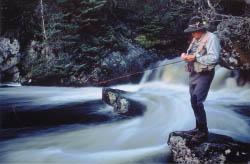Atlantic Salmon and/or
Aquaculture

By Chris Marshall
Back in August, Paul Marriner phoned to invite me down for a
week on the Margaree at the end of October. I put off making a
decision until the eleventh hour, but finally had to turn him down - just
too much to do with the magazine - and spent the time with my nose
against the computer screen and my mind on misty Cape Breton sunrises
and salmon rolling in the bright water.
When we talked-early in November, I must admit I felt a certain smugness
when Paul reported that they'd had little sport as there were very few fish
in the river. It's possible that the heavy rains earlier in the month had induced
most fish to run up into the headwaters, but the absence of fish in what is,
perhaps, Nova Scotia's most prolific fall salmon river was disturbing.
The Atlantic salmon is the most threatened sport fish in the northern hemisphere.
Its range has shrunk. On rivers where salmon once teemed, the runs have
vanished or been significantly depleted from the effects of acid rain, dams,
logging, mining and a host of other intrusions of civilization. Spawning runs
in eastern Canada, especially Nova Scotia, have been disrupted by a succession
of summers of drought-induced low water flows. The ocean feeding grounds
and the forage species on which the salmon depend, have been disrupted by
severe drops in temperature as a result of climate change.
Conservation groups on both sides of the Atlantic have fought heroically to
halt - even reverse - the slide into extinction. During the nineties, tremendous
strides were made in curtailing commercial harvests, both in the rivers and
on the high seas. Aquaculture was welcomed by commercial and sports
fishers alike as a non-threatening alternative to commercial fishing, and
improved runs of salmon on a number of rivers seemed to indicate that
the this strategy was working.
But, ironically, aquaculture now appears to have become as much a problem
as it was a solution. While aquaculture took much of the pressure off the
commercial harvest of wild fish, it's now threatening the very existence of
those wild fish it had initially protected - in the form of effluent from closely
packed ocean pens, transferred parasites and diseases, and genetic
contamination from exotic strains of escaped cultured fish. Even as we
go to press, the first ever case of Infectious Salmon Anemia (a deadly
disease found in farmed Atlantic salmon) has been found in wild salmon
in the Magaguadavic River in New Brunswick.
This is chilling, but not unexpected news. But where do we go from here?
Presently, populations of Atlantic salmon in the ocean have been reduced to
a mere 10% of what they were only twenty years ago. Healing of human-induced
damage to habitat is a Herculean task; and dealing with the effects of climate
change virtually impossible. However, tackling the adverse effects of aquaculture
is a task well within our scope. Aquaculture is a relatively new practice. There
is still time for us to fight for rigorous controls and responsible methods that
will prevent the transfer of disease, parasites and genetic contamination of wild
fish. In an interview with Erik Poole in this issue of The Canadian Fly Fisher,
the new Fisheries Minister, Herb Dhaliwal, appears to support the need for such
measures - an encouraging situation.
This is a huge country and many of us live far from the Atlantic Ocean, and
Atlantic salmon fishing is something which we can only read or dream about.
But the threat is one which affects us all - not only because what happens in
the Maritimes today can happen in the Prairies tomorrow, but because the
death of the Atlantic salmon, so much a part of the history and tradition of
fly fishing would diminish each one of us.
There are organisations in this country such as the ASF, TU, FFF,
BCFFF - and a host of smaller local bodies - which are in the thick
of championing the cause of the Atlantic salmon and every other
sport fish. What a difference it would make if every fly fisher enrolled
in at least one of these, actively joining the fight to preserve our fish
and our fishing. ~ Chris Marshall
|







